6 Sep 2013 | News, Politics and Society, Religion and Culture, United Kingdom
Pavan Amara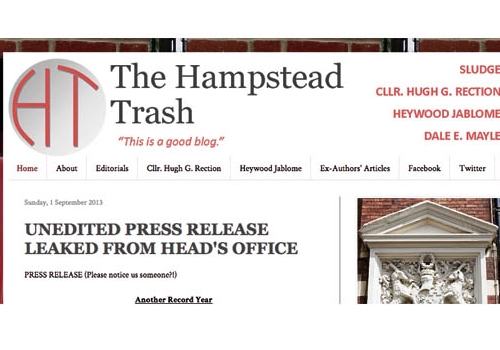 of London’s Camden New Journal has an astonishing story of a head teacher who reported a former pupil to the police, apparently because he student was becoming “more and more enchanted by anti-establishment ways of thinking”.
of London’s Camden New Journal has an astonishing story of a head teacher who reported a former pupil to the police, apparently because he student was becoming “more and more enchanted by anti-establishment ways of thinking”.
Jacques Szemalikowski, head at the Hampstead School in North London, said he was worried that A-Level student Kinnan Zaloom, 19, was “developing into an anarchist” and that he was duty bound to report the teenager to the police for “extremism”. Szemalikowski also contacted Glasgow University, where Zaloom had applied to study, to warn them of his dangerous tendencies.
Szemalikowski told the CNJ:
I must do something. In the last year he has become more and more enchanted by anti-establishment ways of thinking and has even said that there is an inherent risk that every government is corrupt.
Zaloom set up a satirical blog called Hampstead Trash in February of this year. The blog has frequently criticised the way the school is run. Zaloom no longer writes for the blog, having finished school this summer, but it is kept up by current students. It is blocked on the school’s computers.
An editorial posted on the blog last night said in response to the head’s comments to the CNJ said:
You called us dangerous. You called Kinnan “a developing anarchist”. Regardless of Kinnan’s political views and whether he believes in it or not, agreeing with anarchism is not illegal. And we aren’t dangerous. We have never threatened to attack or harm anything or anyone. The only danger is to your ego. We aren’t a paramilitary, we aren’t fighting a dictator who will gas those who don’t agree. All we do is post a few jokes at the school’s expense, often about students and their habits, not at the staff themselves; then occasionally we criticise your and your SLT’s decisions, like the change from 8:40 to 8:35, or giving Sixth-formers late detentions.
Zaloom, who has been banned from the school grounds, told the CNJ: “[W]hat worries me is if I had been a year younger they said they would have expelled me halfway through my A-levels, and that means they would have been prepared to ruin my education because they didn’t like my thoughts.”
Szemalikowski confirmed that he would have excluded Zaloom in that circumstance.
If there’s one consolation to this story, it’s that the police have not been in touch with Zaloom to follow up on Szemalikowski allegations of anarchist extremism.
But it does raise serious questions; if Szemalikowski idea of dangerous anarchism is the notion that governments might be corrupt, how much thought policing is he willing to engage in. Will the young people of Hampstead, home of some of history’s greatest radicals, from Shelley, to Freud to Michael Foot, be allowed think for themselves anymore?
(HT @BrianWhelanHack)
6 Sep 2013 | News, Russia
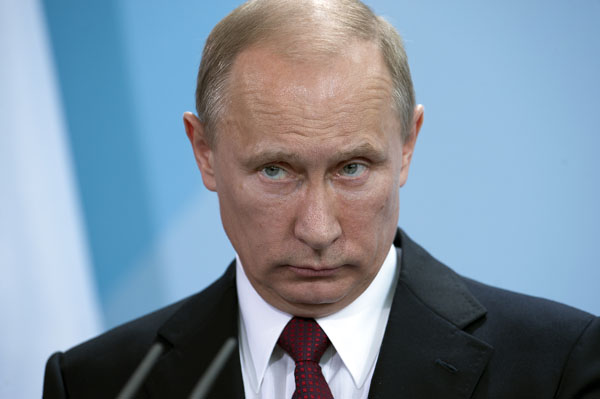
Image Gonçalo Silva/Demotix
Russian president Vladimir Putin hit the headlines around the world after an interview with the Russian First Channel and the Associated Press on 4 September. His statements on Syria were given much attention, with early reports saying it meant Russia might support military intervention. In fact, Putin did not state that clearly, but pegged it to “conclusive evidence of the use of chemical weapons” by the Assad regime.
Close consideration of Putin’s recent public statements shows the same approach applied to other topics, including several human rights issues that Russia has been criticised about lately. Despite a noticeable change of the tone he prefers to give vague comments rather than well-articulated attitudes.
For instance, his reply to criticism on the law that bans “homosexual propaganda” was aimed to show Putin is tolerant to representatives of LGBT community, all the while referring to them as “such people”.
“I work with such people; sometimes I award them with medals and orders, we have absolutely normal relations, and I see nothing special about it,” said Putin in the interview without going into details on who “such people” are and what kind of “work” with Russia’s president they are involved in.
The same seemingly pleasant, but otherwise void impression was given by Putin during his meeting with a presidential Council on Development of Civil Society and Human Rights. During the meeting on 4 September Vladimir Putin put aside his macho-style image of a firm ruler.
“He suddenly appeared to be a different person, a constructive and attentive politician who is open to ideas and ready to consider them,” Andrey Yurov, a Russian human rights defender who is a member of the Council told Index. “He was listening carefully to suggestions about reforming of penal and judiciary systems, adjustments to internet regulations and public control of the state bodies, and reacted with comments like ‘Oh, this is interesting’, ‘We really need to look into that’ or ‘We might need to create a working group on this’. He did not say ‘yes, we will definitely do it’ to any of our suggestions, but at least he did not say a firm ‘no, we won’t do it’ to anything.”
Vladimir Putin even admitted the notorious NGO “foreign agents” law might need to be re-assessed. The law, adopted a year ago, forced all non-governmental organisations that receive funds from abroad to register as “foreign agents” if they are involved in “political activities”. The problem with the law, as many experts and civil society groups have pointed out, is its extremely broad definition of what constitutes a political activity. During the meeting with human rights defenders President Putin said it might be re-defined and narrowed.
“It is difficult to say if it marks a reboot of an attitude of the state towards the civil society and whether any real steps are to follow. But it was a constructive conversation between a rational politician and civil society. Perhaps it has to do with the G20 summit in St. Petersburg; Putin needs to show he is an open leader and he is in touch with civil society of his country,” recons Andrey Yurov.
Yury Dzibladze, the president of the Centre for the Development of Democracy and Human Rights, does not believe Putin’s statement signal any change.
“There are no signs of real improvement of the situation with human rights and civic freedoms inside the country. Criminal cases against political opponents are on-going; inspections of NGOs in line with the ‘foreign agents’ law continue. The rhetoric might change, but it only means the authorities want to improve their image abroad, not alter the situation in Russia itself. It might be connected with the G20 summit and up-coming winter Olympics they do not want foreign politicians to boycott,” said Yuri Dzhibladze.
5 Sep 2013 | Africa, Europe and Central Asia, France, Italy, News, Russia, South Africa, United States
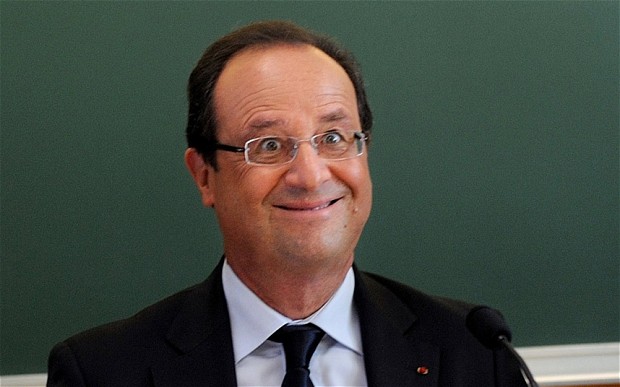 French news agency AFP has been caught up in a self-censorship row after attempting to retract a photo of President Francois Hollande flashing a gormless smile. The whole debacle has gone viral, forcing AFP to make a statement denying they had caved to government pressure. Rather, they cited internal editorial guidelines ‘not to transmit images that gratuitously ridicule people.’ However, politicians are not strangers to banning (or trying to ban!) images that makes them look a bit silly.
French news agency AFP has been caught up in a self-censorship row after attempting to retract a photo of President Francois Hollande flashing a gormless smile. The whole debacle has gone viral, forcing AFP to make a statement denying they had caved to government pressure. Rather, they cited internal editorial guidelines ‘not to transmit images that gratuitously ridicule people.’ However, politicians are not strangers to banning (or trying to ban!) images that makes them look a bit silly.
 You’d think that Vladimir Putin, used to being in the public eye, captured in completely random and non-staged situations like this, wouldn’t mind being the inspiration for some fine art. That turned out not to be the case when a St Petersburg gallery exhibited a painting of Putin and PM Dmitry Medvedev – the former sporting a fetching pink negligee, the latter a black lace push-up bra. Russian police raised the gallery and removed the picture in question, as well as three others depicting Russian political leaders. The reason given was that the imagines ‘violate existing legislation’.
You’d think that Vladimir Putin, used to being in the public eye, captured in completely random and non-staged situations like this, wouldn’t mind being the inspiration for some fine art. That turned out not to be the case when a St Petersburg gallery exhibited a painting of Putin and PM Dmitry Medvedev – the former sporting a fetching pink negligee, the latter a black lace push-up bra. Russian police raised the gallery and removed the picture in question, as well as three others depicting Russian political leaders. The reason given was that the imagines ‘violate existing legislation’.
 Back in 2009, artist Conor Casby painted two pictures of former Irish taoiseach Brian Cowen sitting on a toilet naked. He then hung them on the walls of the National Gallery and the Royal Hibernian Gallery in Dublin, and broadcaster RTE made a short piece about it. The outcome? RTE had to issue a formal apology and remove the item from its online archive. Meanwhile, the police launched a country wide manhunt for Casby. He had to hand over five more paintings to the police and faced potential charges of indecency, criminal damage and incitement to hatred. All for making a politician the butt of his joke.
Back in 2009, artist Conor Casby painted two pictures of former Irish taoiseach Brian Cowen sitting on a toilet naked. He then hung them on the walls of the National Gallery and the Royal Hibernian Gallery in Dublin, and broadcaster RTE made a short piece about it. The outcome? RTE had to issue a formal apology and remove the item from its online archive. Meanwhile, the police launched a country wide manhunt for Casby. He had to hand over five more paintings to the police and faced potential charges of indecency, criminal damage and incitement to hatred. All for making a politician the butt of his joke.
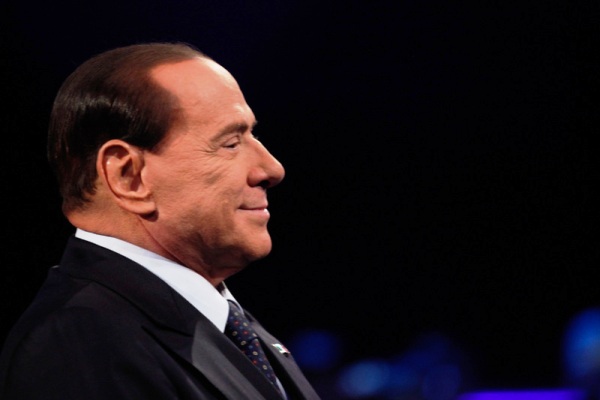 In 2002, former Italian Prime Minister Silvio Berlusconi was accused of censoring a play putting him and his compatriots in an unfavorable light. Renowned theatre director Luca Ronconi used caricature pictures of Berlusconi and two other ministers as props in his production of Greek comedy “The Frogs.” Ronconi said officials from ruling party Forza Italia tried to make him remove the pictures from stage. Berlusconi, on the other hand, stated that while the pictures ‘didn’t please him’: ‘The government, the whole government, doesn’t even know what censorship is.’
In 2002, former Italian Prime Minister Silvio Berlusconi was accused of censoring a play putting him and his compatriots in an unfavorable light. Renowned theatre director Luca Ronconi used caricature pictures of Berlusconi and two other ministers as props in his production of Greek comedy “The Frogs.” Ronconi said officials from ruling party Forza Italia tried to make him remove the pictures from stage. Berlusconi, on the other hand, stated that while the pictures ‘didn’t please him’: ‘The government, the whole government, doesn’t even know what censorship is.’
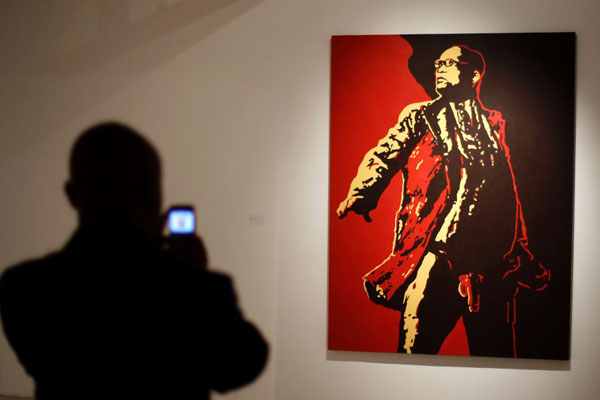 South African President Jacob Zuma caused quite a stir when he demanded that a painting of him be removed from Johannesburg’s Goodman Gallery. ‘The Spear’ was in the style of portraits of revolutionary leaders, but for small fact that his, um, spear, was hanging out. He also wanted City Press newspaper to remove a photo of it from their website. When both refused, Zuma’s party the ANC declared they would take the gallery to High Court and called for a boycott of City Press. Finally, a couple of ANC supporters were caught on tape defacing the painting. Taking the matter of The Spear into their own hands, some might say (sorry).
South African President Jacob Zuma caused quite a stir when he demanded that a painting of him be removed from Johannesburg’s Goodman Gallery. ‘The Spear’ was in the style of portraits of revolutionary leaders, but for small fact that his, um, spear, was hanging out. He also wanted City Press newspaper to remove a photo of it from their website. When both refused, Zuma’s party the ANC declared they would take the gallery to High Court and called for a boycott of City Press. Finally, a couple of ANC supporters were caught on tape defacing the painting. Taking the matter of The Spear into their own hands, some might say (sorry).
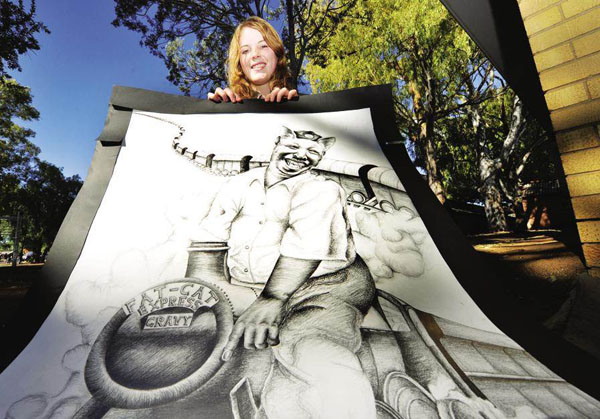 At least it seems the future leadership of the ANC is getting some training in dealing with awkward art-related stories of their own. Bloemfontein student Alta Bonnet (17) was told her painting depicting former ANC Youth leader Julius Malema ‘as a fat cat on a gravy train’ might not be exhibited at a city art show. The picture was deemed ‘too political’.
At least it seems the future leadership of the ANC is getting some training in dealing with awkward art-related stories of their own. Bloemfontein student Alta Bonnet (17) was told her painting depicting former ANC Youth leader Julius Malema ‘as a fat cat on a gravy train’ might not be exhibited at a city art show. The picture was deemed ‘too political’.
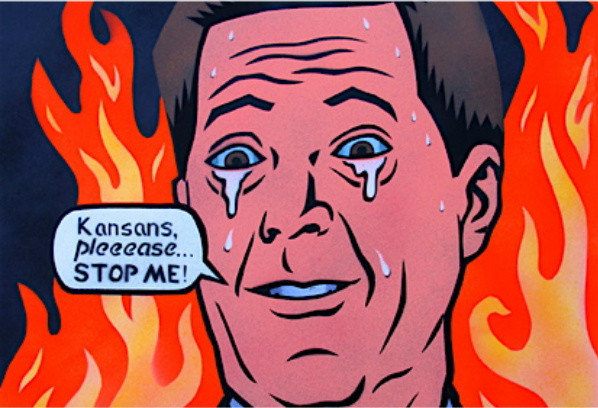 Kansas artist Dave Loewenstein last year had his picture of Governor Sam Brownback removed from a cafe in the state’s capital Topeka. The picture is a cartoon depiction of the governor, with the words ‘REJECT BROWNBACK’ printed on. Loewenstein said the picture was in protest at Brownback’s policies and not him personally. Greg Ready, the landlord of the building, said they had chosen to remove the painting because Brownback’s daughter worked at the cafe in question, adding ‘there was no political motivation for this action whatsoever.’
Kansas artist Dave Loewenstein last year had his picture of Governor Sam Brownback removed from a cafe in the state’s capital Topeka. The picture is a cartoon depiction of the governor, with the words ‘REJECT BROWNBACK’ printed on. Loewenstein said the picture was in protest at Brownback’s policies and not him personally. Greg Ready, the landlord of the building, said they had chosen to remove the painting because Brownback’s daughter worked at the cafe in question, adding ‘there was no political motivation for this action whatsoever.’
But you could understand Brownback being a little thin skinned – this wasn’t the first time he had been viciously attacked. In 2011, when his office took note of a tweet by High School student Emma Sullivan (18), her principal demanded she write an apology letter to the governor. The tweet? “Just made mean comments at gov. brownback and told him he sucked, in person (hash)heblowsalot.” Scathing.
Have we missed any? Let us know in the comments!
5 Sep 2013 | Comment, News, United Kingdom

A troll, yesterday
Law firm Schillings has relaunched as a privacy and cyber security firm, the Lawyer reports.
Schillings, scourge of many a Fleet Street editor, clearly believes the future of libel and privacy lays online. As such, they have co-opted online security firm “Vigilante Bespoke” into “Schillings IT Security”.
Vigilante Bespoke (which wouldn’t be a bad rapper name) started in 2009 as an “ethical hacking” business, testing gaps in firms and individual’s technological security.
Now, Vigilante Bespoke founder Oliver Crofton is being cast by Schillings as the Trollhunter General. He explains on the Schillings site:
“Although the internet is seen by some as anonymous, everything we do online leaves a “digital fingerprint”, which in some instances can be traced to uncover valuable identifying information.
“During investigations we look to uncover IP addresses (these are unique codes that relate to an individual home or office internet connection), which can often lead us to the street address of the person posting the nasty comments. In some instances, website server connection logs can be analysed, which can give us the mac address (a computer’s name and location) of the computer being used to post the unsolicited content.
“Simple tools also help when tracing people online, such as indepth online searches for usernames; as these are often used across several websites and each website may vary in the amount of information available about their users.”
Apart from troll hunting, the Schillings site has lots more to say on social media: what does a company do, for example, when compromising pictures of senior figures are Instagrammed (“the Weiner Dilemma” perhaps?). How to deal with negative customer reviews on say, TripAdvisor, or how to handle an ex-employee who can’t stop ranting about your company online?
The Schillings site is, in its own way, an indicator of where the new libel and privacy battles will be fought. It’s not about newspapers any more.
(ht Leah Borromeo)
 of London’s Camden New Journal has an astonishing story of a head teacher who reported a former pupil to the police, apparently because he student was becoming “more and more enchanted by anti-establishment ways of thinking”.
of London’s Camden New Journal has an astonishing story of a head teacher who reported a former pupil to the police, apparently because he student was becoming “more and more enchanted by anti-establishment ways of thinking”.




 In 2002,
In 2002, 


